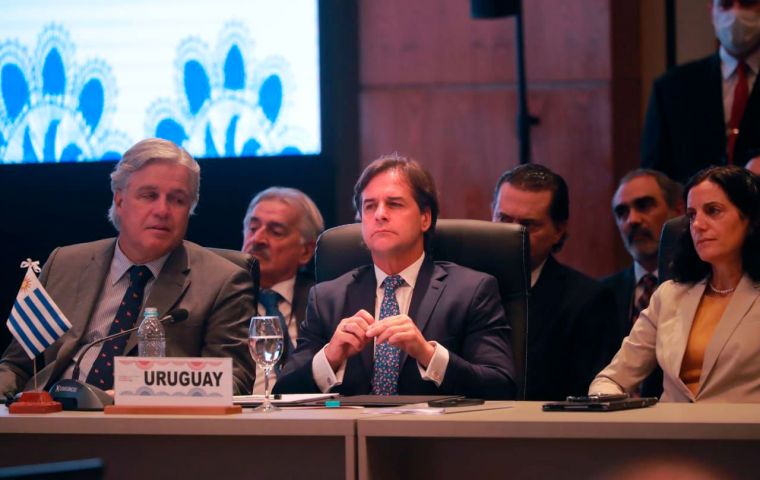MercoPress. South Atlantic News Agency
Uruguay refuses to sign Mercosur Summit's joint statement
 Lacalle said the document was not open to “flexibilizing” the bloc
Lacalle said the document was not open to “flexibilizing” the bloc The Government of Uruguay Thursday refrained from signing the joint document penned at the Mercosur Summit in Asunción, on the grounds that it lacked any mention of flexibilization, which the Luis Lacalle Pou administration needs to broker one-on-one deals with other blocs or countries or blocs of the block.
Hosting President Mario Abdo Benítez opened the meeting with a speech in which he highlighted Mercosur's deal with Singapore
Read also: Mercosur clinches Singapore FTA, announces CET cuts
“This is the path that Paraguay believes should be followed for the internationalization of the bloc,” said Abdo, who also insisted on the need that Mercosur member countries understand that free trade agreement negotiations “must be done as a bloc”.
Abdo also praised the CET reductions, which will “help mitigate the inflationary condition that the region is experiencing.”
And he also highlighted the creation of a Mercosur agency to handle infrastructure investments to better compete in international markets by taking advantage of the region's resources.
“For Paraguay, these three achievements during the pro tempore presidency are very significant,” he said.
Lacalle underscored the importance of meeting face to face with his presidential colleagues, although Jair Bolsonaro chose not to attend the event. The Uruguayan leader argued that “it is so much nicer and easier to relate and understand each other,” when you can “look at each other's faces,” shake hands and look into each other's eyes,
“Life is made of resolving tensions,” Lacalle argued. “For that, we must be sincere, understand each other, and be understood. Of course, always within the parameters that we have self-imposed as an organization,” he added.
Lacalle also praised the Singapore deal but voiced Uruguay's concern regarding “the lack of progress” in negotiations with the European Union. He also said he welcomed a bilateral agenda between any given two Mercosur member countries, for example, Argentina and Brazil.
Regarding the FTA with China, Lacalle insisted on making the bloc more flexible to allow this type of agreements, but to no avail. “There is the issue of bilateral negotiation, we have the immense tranquility that in these forums, virtual and hand-to-hand visits, we tell everyone the Uruguayan national feeling and where we understand we have to go.” He then insisted Uruguay would continue with the Chinese negotiations and offer Mercosur partners to “move forward together.”
“Once the first stages are finished we will invite the [Mercosur] partners to join in, so as to make a bloc with more negotiating power, but otherwise Uruguay is going to advance anyway”, he added.
Argentine President Alberto Fernández explained that this is “a singularly difficult time in the world,” amid the COVID-19 pandemic and the Ukraine war, following the burdensome inheritance bequeathed to his administration by Mauricio Macri.
Fernández also forecast that the world to come is one “of the regions, not of the countries.” He also pointed out that there are “two great concerns” in the world of today: where food and energy will come from, which creates a “unique opportunity” for Mercosur.
“We are in a continent that has what the world wants for tomorrow, and if we do not realize that we have to be more united than ever we are going to make the worst of mistakes,” Fernández stressed while speaking in favor of “eliminating the asymmetries” that exist within the regional bloc by working together with the members of Mercosur. “We should not be under the illusion that we are looking for individual solutions.”
“I do not refuse at all to analyze what my dear Luis Lacalle calls flexibilization,” added Fernández. “Why don't we analyze it together?” he suggested, with the Chinese FTA in mind.
Bolsonaro said in a virtual appearance that trade and investment flows should be increased in the region and the Caribbean, while also negotiating with more distant partners, he added.




Top Comments
Disclaimer & comment rulesCommenting for this story is now closed.
If you have a Facebook account, become a fan and comment on our Facebook Page!